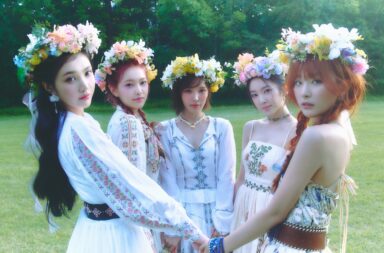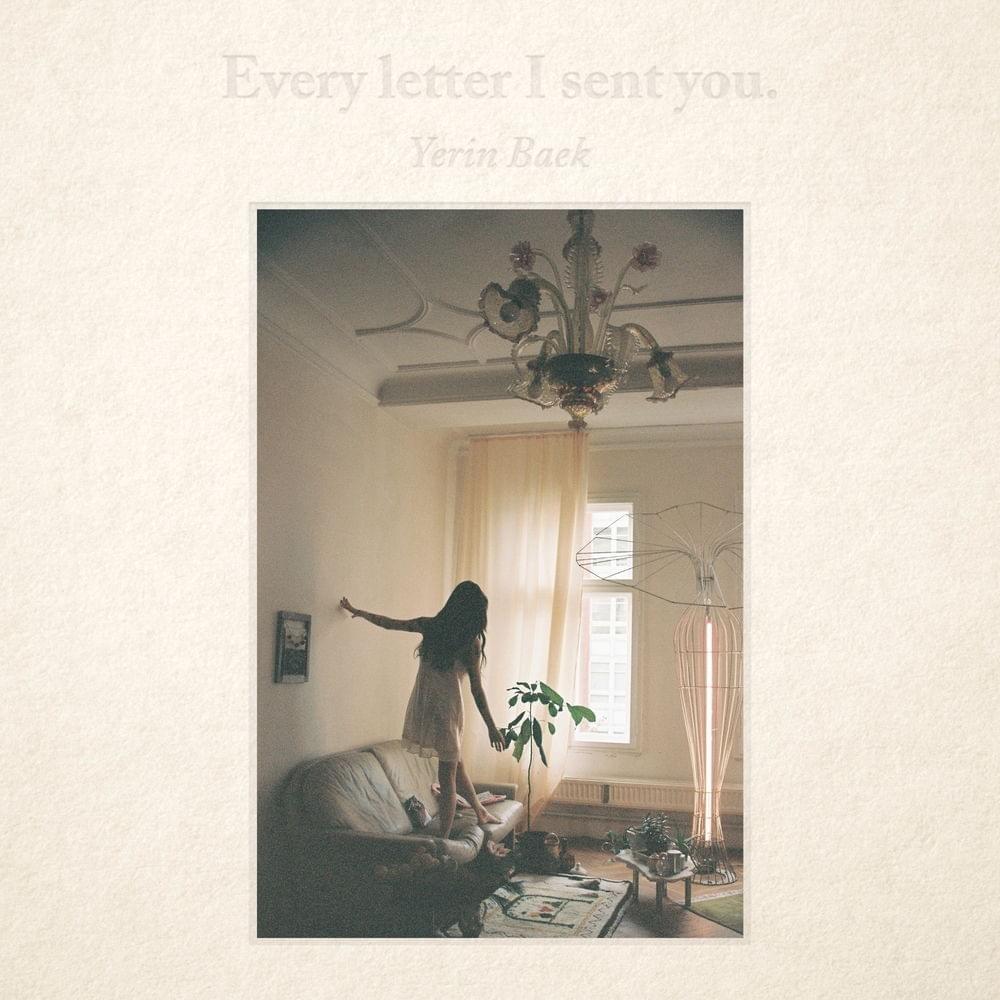
Imagine it’s a quiet winter morning, where everything is still and cold. You’re a little sleepy, but you suddenly feel the need to clean out excess stuff lying about in the room. Crammed in a dusty corner of the bookshelf is an old scrapbook full of memories, Polaroid shots, and letters. Time grows hushed as you turn each page that holds various recollections made with people you once knew. As the reality of time sinks in, your heart remembers feelings of regret, love, admiration, fear, and more. Whether this was the inspiration or intention behind Baek Yerin’s first full-length album “Every letter I sent you.” the outcome is a threadbare, dreamy collection of songs that will keep a lonely heart company.
This album is Baek Yerin’s first work post-JYP Entertainment, as she now runs her own independent label Blue Vinyl and participates in her band ‘The Volunteers.’ It was released in Tuesday, December 10 as the perfect accompaniment for lonely daydreams. This album also maintains the same dreamy sound she’d shown earlier with her last JYP album “Our Love is Great,” released back in March. Just, this one is more threadbare with how Yerin draws out each one of her thoughts for us to dwell on.
While only one track out of her eighteen song setlist is in Korean, her lyrics are creative, insightful, and vulnerable in its details. According to Baek Yerin via her label’s Instagram, “This album reflects memories, dilemmas, and thought processes I had from when I was nineteen to twenty three. With no specific address, I’ve been mailing my feelings in form of songs. And I’m really glad that I can finally mail them to you all. This album is my way of thanking everyone who has been loving me and supporting my journey as a musician.” On this note, she partook in the production of all the songs, and even managed her own styling.
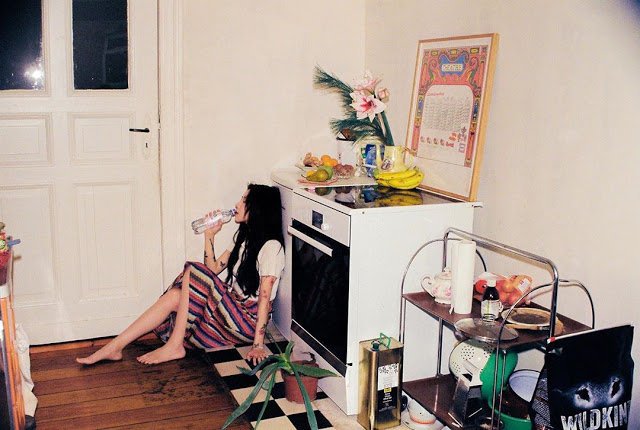
Her album cover aesthetics are accredited to the photographer who can best capture Baek Yerin’s dreamy perspective, @mu_gung. The cover resembles a scrapbook, with a cozy photo of Yerin tiptoeing on her couch. The mood is set in with a contrast in lighting — it’s dark from where the camera takes her photo, but the window provides just enough lighting to show her silhouette. This enables numerous interpretations, such as a transition from one phase to another, or a juxtaposition of good and bad dreams . The setlist and aesthetic also allows every listener to take away something different based on how they receive Yerin Baek’s messages.
However, 18 tracks is a lot to cover, even without the intro. The first track itself is similar to Epik High’s “Sleepless” as the beginning of the album — a track mostly silent until the end, with a short serenading of instrumentals to set the mood and tone for the rest of the long-awaited album. On that note, I’ve organized the songs into four groups based on musical similarity. This was a difficult task, considering all of these tracks were put together to contribute to one main album and genre. Nonetheless, I hope it’ll make it easier to understand each song a little better.
Gloomy, cloudy day songs about expectations: “Rest,” “Mr.gloomy,” “Not a girl,” “0310”
If you were to consider each group has having a “temperature”, this group is reminiscent of a gloomy, cloudy day. The beats are mellow and Yerin’s voice is light but cold. The lyrics speak of her searching for peace as she is reminded of her past lover from certain traces.
First, “Rest” is a laid-back track that dwells on the desire to simply daydream at home — which can feel so far away sometimes. Baek Yerin desires a place that’s clear, requires no explanation, has no complaints or other people watching – some place she can truly rest inside and out. “I just want to be free,” she repeatedly sings, which is a sentiment many of us can share. She sets the mood for the rest of the album with this more relatable track, perhaps as a means for the rest of her “letters” to start.
Meanwhile, “Mr.gloomy” compares a past lover to the gloomy days of London. The line “I really loved you, don’t you, didn’t you know it?” ends the chorus just as an electric guitar hook glides in and adds some jazz to the mellow track. It’s a rather new take, imagining a lover himself was gloomy enough for Yerin to relate to him through her current loneliness without him. Directly relating him to a certain type of mood also saves some words to paint a more vivid picture.
On the other hand, “Not a girl” is all about Yerin wanting to speak up for herself against a lover who doesn’t seem to truly be for her. There lies a misunderstanding between who he attempts to see her as, versus who she believes she truly is. The lyrics portray a disappointment that doesn’t see any hope:
I hate when I have to be there to do stuffs you’d want me to
You know I have something to do
Since I wasn’t the girl that you knew
Let’s not talk about that, In front of lives ahead
Changes are many
But steady things are dead
Going beyond a mere conflict, the lyrics express the helpless outlook felt regarding all relationships with others. Yerin further emphasizes, “[I] Can’t be what you want / I can’t be what you were / I can’t say I have done so many things but now / Can’t be good enough.” In other words, she measures her worth based on merely his approval. In some ways, these three songs touch on the incomplete reconciliation of expectations and understanding.
Lastly, “0310” is more of a lightweight ballad that explores the difference between love and worth. What comes first as a priority, if it even matters? Yerin goes back and forth from appreciating small gestures from her lover, to assuring herself she is okay with him leaving despite the ensuing loneliness. They may have loved each other, but the contrast in goals, and in how they individually approached their love, may have made all the difference. Still, the song ending with “You smoked and you looked at me / I hate it when you do” implies a seeming lack of closure, as Yerin hones in on this last act that has ultimately split her heart between truth and desire.
Cute, wistful songs on love and its struggles: “Popo (How deep is our love?),” “Datoom”
Now, moving onto the next group — which consists of her title track and the only Korean single in this album. In contrast to the first set of songs, “Popo” is a romantic song where Yerin serenades her potential lover with a kind of poem. Her diction hints at not just fulfilling a one-sided love, but in finding adventure — in wanting to “run together” as the two “get away from their [the world’s] unkindness.” The chorus further weaves up a sweet fairy tale daydream through a simple composition of words:
Can I walk with you?
Or have a tea with you
Your scent makes me feel like I live in Paris
Can I love you?
Giving my all to you?
The drum and acoustic instrumentals for “Popo” creates a cute, charming atmosphere, while the slight jazzy tones in the end makes for a perfect night track.
On the other hand, “Datoom” compares the good and bad sides of a relationship. When all’s good and well, she’s so happy she can’t believe it; but when that same mouth fights with her (the literal meaning of the title is to fight, or quarrel) there isn’t anything she can do. His eyes had seemed so lovely, but when they’re angry it makes her nervous. So all she can do is fall asleep so she won’t think about anything. This is definitely a relatable conflict that anyone in love and/or in a relationship must feel, but it’s rare to hear such a common conflict be explained so simply through a song. The more one explores the album, the more s/he can see how Yerin speaks as though she is reading from letters, as the lyrics hone in on one specific fleeting thought or realization.
Calm winter lullabies for the lonely on a white morning: “Can i b u,” “Meant to be,” “lovelovelove,” “Berlin,” “London”

With this set, we transfer back to white winter mornings — but with lullabies instead of forlorn recollections. A good chunk of the songs in this album are more reminiscent of lullabies, based on both the instrumental and mood combined. Starting with “Can i be u,” the track is a short acoustic piece of twelve lines, the instrumentals barely present as Yerin’s voice half whispers a secret, daring wish. She sounds almost childlike as she asks to be “not afraid of anything” and to “never seem weak at all.” It’s unclear to whom she’s exactly addressing, as it can – but doesn’t have to be – a lover. In comparison to the addressee, who destroys everyone like a powerful lion, she considers herself a coward. Thus, she too desires to be just as cruel. If anything, this is probably not a love song.
Next, “Meant to be” is another track that is poetic and succinct — a track that defies the expected structure of a song. This track too seems more like a personal letter, as Yerin implores a lover to not say a number of things…only to imply later that she is utterly helpless against his kind love. The chorus and verses reveal an inner battle of the heart, where Yerin struggles to reconcile the beginning and end of a relationship with the “same” lover. Along with “Can i b u,” this track is also impeccable for its delivered perspective. The lyrics speak of something so much deeper, despite those words being the bare outcome of endless thoughts. For “Meant to be,” Yerin probably knows that everything she doesn’t want to hear is the truth. In some ways, one can envision her singing more towards an imaginary figure of her lover, desperate in denial.
On the other hand, “lovelovelove” is more of a simple love letter. The verses speak of how much the narrator desires the love to continue, naming her lover as a focal point for where she is and where she’ll keep moving towards. Meanwhile, the chorus of the song is a poetic, romantic set of lines that is probably inspired from an English play of ages past:
You’re the poet in my heart
The changes in my mind
Pounding in my heart
You’re everything in my head
You’re the dreams I’ve always wished
A chance to be better
Flowers in my path
My love
This particular track also utilizes piano as the main, classical instrumental, as it is the first ballad of the album. For this song too, Yerin’s voice carries the majority of the song, with the piano used as a subtle backdrop to simply carry her lyrics through. Personally, it’s good to see that Yerin has paid attention to such subtle detail such as the balance in what the listener may hear.
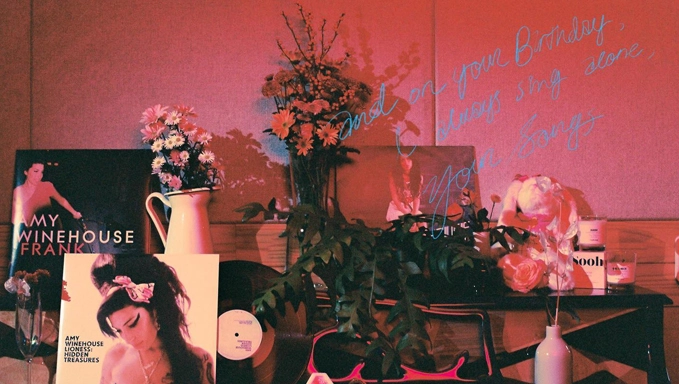
The remaining two songs in this collection are named after cities: “Berlin” and “London.” Despite this one similarity, these two tracks remain on complete opposite ends of the spectrum — “Berlin” speaks of the peak of love, while “London” despairs over a falling out from love. Perhaps Yerin intentionally chose locations as the titles for these songs, in order for these names to be symbolic of certain seasons. Indeed, in “Berlin,” the lyrics speak of her wondering where she and her lover should go for November and December: general months of the holidays. The song relishes the fact that she has met him, and there is a hopeful, whimsical atmosphere implied from the instrumental as well.
Meanwhile, whatever has occurred in London seems to have wrought on an unwelcome reality. Throughout the song, Baek Yerin repeats that “I gotta move on for what I am,” after seeing that she and her lover are not on the same page after all. Ultimately, he cannot seem to accept, nor believe, her for who she fully is. Despite the pain that comes from seeing his promised happiness fail, she chooses to like and prioritize herself in response. The lyrics are full of woe and resilience at the same time, as Yerin sings:
I’m so sad that you’re not same with me
But still have to move on
Gotta make this love clear
From the man who don’t believe me as I am
I gotta move on for what I am
Considering this is the ending track of the album, the last line in particular is significant in showing Baek Yerin finally can move on and close this scrapbook of letters — this time with closure.
Overall, this collection of songs touches on fear, admiration, desire, love, regret, wonder, and sadness. The order of these songs align with one another, as “Can i b u” touches more on initial admiration of someone desired. Meanwhile, the rest of the tracks go from hesitation and doubt to falling in love, to dwelling on and questioning a past relationship.
Mainstream, stylish songs about love: “Bunny,” “True Lover,” “Square (2017),” “Amy,” “Newsong2,” “Point”
You’ve made it to the last collection! This last group of songs range from mainstream to more intricately stylish in terms of genre, and thus is the best representation of Yerin’s creativity in music.
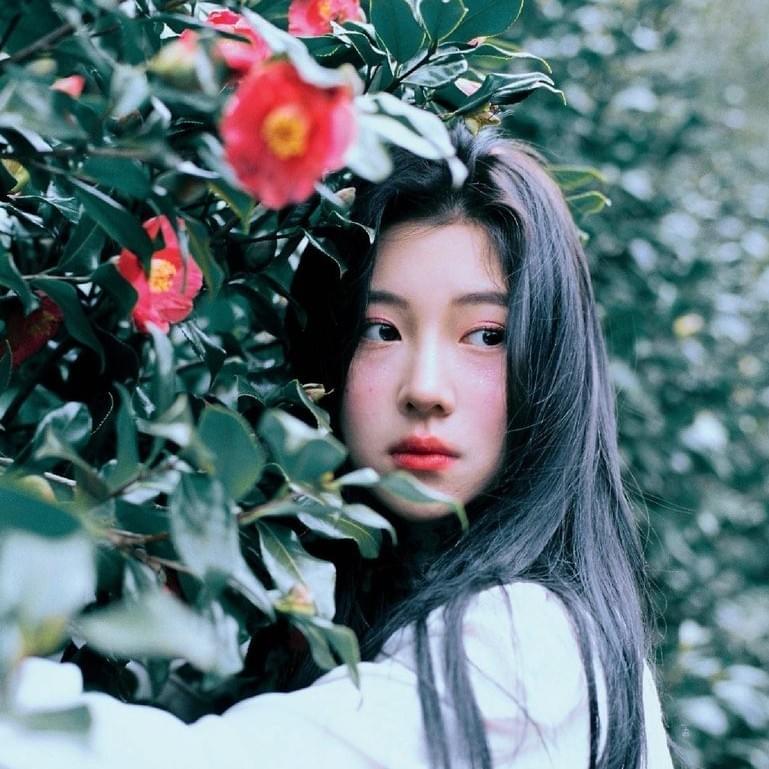
First, “Bunny” is told from the perspective of a “doll” — a cute item that provides company and is loved solely upon the owner’s will. Another creative take, as it provides room for both fantasy and a darker reality to be juxtaposed in the same one track. In the verses, the lyrics display a blind belief in the words of affirmation that the bunny’s owner supposedly speaks — from lighting up his world to being his sunshine. In the end, the bunny confesses that she can indeed be anything for him, but that true faith and love will take time. It’s almost ironic how faith is mentioned within the relationship of ownership, but this irony and its consequences are displayed so subtly and cleverly throughout the song. The instrumentals are also catchy and rhythmic in its synths, as this track is the closest to that of a “mainstream” track in terms of structure.
Next, “True lover” is more mellow in sound and a bit darker in story. This song seems to refer to Yerin from an outside perspective, such as a distant acquaintance or even a mere gossiper. Perhaps the speakers are even more than one, considering the chorus simply refers to “her”:
Her songs, I always sleep into
Her word, that always made me feel the same
Her love, wish I was her friend and knew everything
Her, her
The song as a whole is pretty vague in regards to conceptual meaning, but one way to interpret it is to understand these words as coming from society. There is the idea that whomever “she” is, she is the perfect, representative ideal of a person to know and admire. But then again, it is unclear who is exactly “speaking” in the verses — is it the same “her” that everyone seems to admire? Or is it the listeners who compare themselves to whomever star is in their eyes? Essentially, this song tends to bring forth more questions than answers.
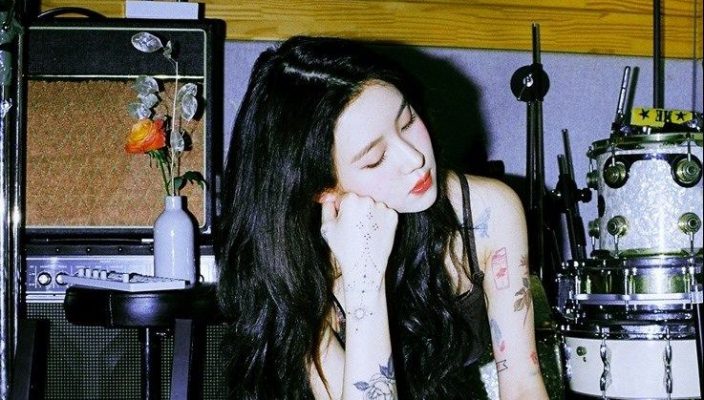
Meanwhile, a popular addition the album was her beloved private track “Square (2017).” This song was one of the few that her fans have long relished to hear officially, and Yerin has at last responded by including it into this long album. Despite the song having been made two years ago, it hears as a classic the moment it begins. To say that the song is merely “catchy” is an understatement, as a variety of instruments seem to “crash” in at once to get the listener hooked. The entrance is powerful and dreamy at the same time, despite the official genre being ballad. The instrumentals remain unmatched with Yerin’s powerful singing, as these two parts hold hands to create a truly touching song to move anyone’s heart.
The lyrics are rather vague in that they warrant multiple interpretations — anything from the muffled voices one might hear while being dizzy in a party or just a recollection of half-hearted assurances she might have accumulated when in a rut. Or, it can even be a love song from her towards another, depending on how one registers Baek Yerin’s strong singing. If anything, this song is a definite, pleasant surprise — considering the majority of her previous lullabies and Indie songs.
Moreover, “Amy” is the shortest track in the entire album with only eight lines. Its length is similar to that of “Can i b u,” as is Yerin’s minimal approach in singing. From the title itself, it’s clear this song is a tribute to singer-songwriter Amy Winehouse, as Yerin’s vocal tone distinctly shifts in color and range. Despite the succinct delivery of this song, the simple, yet sorrowful approach invoked through the song makes for a very stylish track that calls for plenty of late-night soul-searching:
I’m sorry that I’m so late
In front of all your vinyl, I sing of you
All the greatest memories beyond our songs
Listen to you makes me feel completeWhat a hard day we made through
When you say It’s okay to be blue
I will tell my friends I love them so much and
And our day will come..
Yerin has done a splendid job in her attempt to make a tribute to another past amazing artist. On the other hand, “Newsong2” plays around with the meaning of the word “normal.” As the lyrics bitterly reflect upon her past naivety within a relationship, the goodbye she feels now drives her to think, “Why can’t I just love like normal?” This is a question that is striking and relatable simultaneously — we may believe that giving our all into a relationship is the adhered “normal,” but it is also worth questioning whether “normal” simply requires boundaries that enable easier goodbyes. Indeed, the lyrics express dismay that the now lone narrator can’t seem to be as cold as he has seemed to be in ignoring her pain and leaving. Once again, as in “Can i b u” and “Not a girl,” Yerin reveals the conflict behind projecting or remaining true to one’s own self.
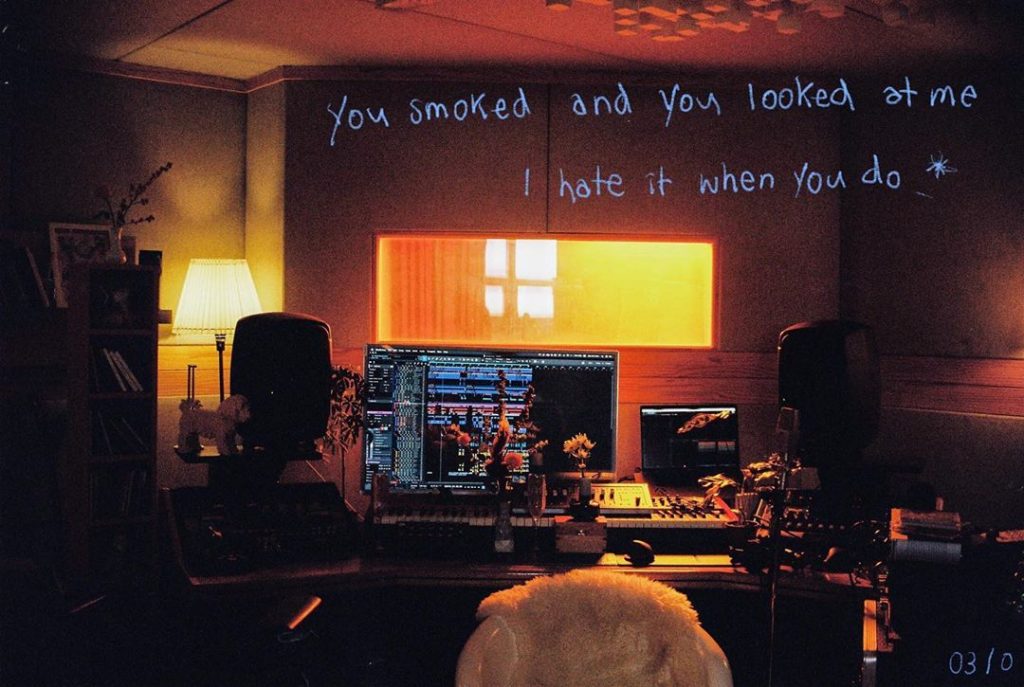
Lastly, “Point” was the only track with a featuring, this time with Loopy: a member of hip-hop crew MKIT Rain. To be frank, this was quite a surprising collaboration of not only voice color but also genres. Though thankfully, it has worked out to be a distinct track that merges Indie and Hip-Hop together into one. Repetitive guitar riffs keep the listener hooked as they wait for the split second drop that welcomes Yerin’s more straightforward tone. This time around, Yerin sings from the perspective of blunt resignation, as she repeats that “There is no point, that is a point.” Anything from love to effort to consequences are dismissed by a heart possibly weary of still trying.
Loopy’s mix of Korean and English lines further drive this point home as, speaking from the male figure in the relationship, both he and the people surrounding him think there is no worthy outcome of a love that can’t ever be resolved. The cherry on top is his trademark laid-back voice which, despite a tad overload of autotune, doesn’t seem too out-of-place when juxtaposed to Baek Yerin’s sweet, sing-song vocals.
Overall, Baek Yerin has returned with a full masterpiece as a means to mark her transition from agency to independent label. Simultaneously, she has fine-tuned her trademark dreamy sound that keeps old fans happy and new fans pleasantly surprised. What did you think of her latest album, readers? Let us know in the comments below!

